If you are just starting to learn about personal finance, should you focus on achieving the highest credit score possible?
Aiming for a perfect credit score is a distraction for most beginners. After all, credit is just one of the pillars of a strong financial foundation. There are individuals with scores over 800 who will struggle to save for retirement or keep a budget.
That being said, there are benefits to having excellent credit (even if you don’t have a perfect score). In this article, you will learn about how credit scores are calculated, how you can increase your score – and yes, even what it takes to get that perfect 850 score.
What is the highest credit score?
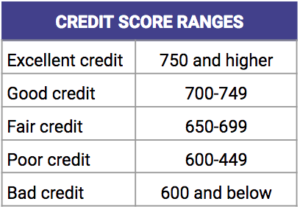
So what is the highest credit score possible?
The highest possible score is 850. This is the maximum score for both of the major scoring systems: FICO and VantageScore.
Do you want to know how does your current score compares to others?
Any score above 700 is generally considered to be “good” credit. Over 56% of FICO scores are ranked as “good” or “excellent.” In July 2017, the average FICO score reached 700 for the first time in its history.
During that same time period, FICO reported another interesting statistic: just as many US consumers have 800+ scores as those who scored 600 or below.
With so many people joining the so-called “800+ credit score club,” it’s no surprise that many people want to know how to hit that perfect score!
If you have bad credit, don’t despair. While improving your score to a “good” or “excellent” range won’t happen overnight, there are clear steps you can take to increase your score.
How your score is calculated
Whether you want the perfect credit score or increase your score just enough to qualify for better interest rates, it is helpful to understand how your credit score is calculated.
After you understand what factors influence your score, you can take specific actions to increase your score.
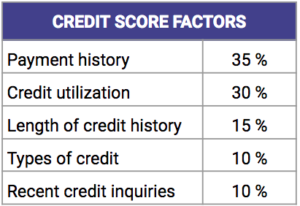 There are five major factors that impact your credit score (ranked by importance):
There are five major factors that impact your credit score (ranked by importance):
- Payment history
- Credit utilization
- Length of credit history
- Types of credit
- Recent credit inquiries
Each of these factors tells some type of story about the potential risk you offer to a potential lender.
Do you forget to make your payments? Did you just open your first credit card? Are you seeking a new credit card because you’ve maxed out your existing ones?
By spending the time to review and optimize each factor of your score, you can tell potential lenders a better story about your financial history and your ability to responsibly take on debt in the future.
How to get your max credit score
To get the highest credit score possible, you will need to improve your standing in each of the major categories.
Payment history
Make sure you pay at least your minimum payment each month. Additionally, you should check your credit report for any errors or suspicious activity. Only 39% of people have obtained a copy of their credit report. You can request a free copy of your report up to 3 times a year.
Credit utilization
Your credit utilization ratio is the percentage of your credit limit that you are using at any given time. For example, if you have $10,000 of balances and $50,000 of limits across your credit cards, your credit utilization is 20% ($10,000 divided by $50,000).
To improve your credit score, aim to keep your credit utilization under 30%. However, you don’t need to carry a balance just to get the highest credit score possible. It’s always best to pay off your balances in full to avoid debt.
Length of credit history
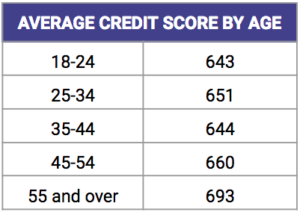 There are two main tips for doing well in this category: (1) don’t open too many new accounts at once, and (2) keep your old accounts open.
There are two main tips for doing well in this category: (1) don’t open too many new accounts at once, and (2) keep your old accounts open.
Opening too many cards at once will lower the average age of your account. With great power comes great responsibility: If you have rapidly opened many new accounts, lenders may worry that you have access to large credit lines of spending power that you haven’t proven you can manage.
Although it is tempting to close old credit cards you don’t use anymore, they can provide valuable leverage in building your average account age.
So long as there isn’t an annual fee attached, plan on keeping your accounts open even if you don’t plan to make purchases with that card again in the future.
Types of credit
One of the lesser factors is how many types of credit you have included on your credit report. Credit cards, mortgages, car loans, student loans, and more… They all come together to paint a picture of your creditworthiness.
You aren’t required to have each kind of credit. Don’t worry about taking out new or unnecessary loans just to expand your credit mix. Most individuals will gradually add new types of credit over time.
Recent credit inquiries
New credit inquiries remain on your credit report for two years. However, FICO only factors credit inquiries from the past 12 months when calculating your score.
Just like your types of credit, your number of recent credit inquiries plays a small part in the big picture.
One consideration: if you are trying to increase your credit score before applying for a mortgage, you may want to postpone new credit inquiries until after your mortgage loan is approved.
Are there benefits to a perfect credit score?
Take a moment and ask yourself, “Why do I want a perfect credit score?”
If you consider yourself a perfectionist – or hang out in some social circle where an 850 score has gravitas – then, by all means, go for it.
There are two main benefits to having the highest credit score you can get:
- Qualifying for the best interest rates on loans
- Gaining access to credit cards with the best perks
The reality is that these benefits are exactly the same whether your score is 800 or 850.
Joining the 800+ credit score club puts you in the top 80th percentile (in other words, only 20% of the population has a score over 800) and is sufficient evidence for all lenders that you’ll be a reliable customer.
How to get an 850 score
… But what if I really want to get that 850 score?
If you are reading this post wanting to know how to get perfect credit in six months, you will be disappointed. To earn the highest credit score, you don’t have to be perfect, but you do have to be patient.
Even if you already have “excellent credit,” it may take several years to reach that magical 850 score.
There are certain benchmarks you will need to hit in each of the main factors to get the highest score:
Payment history
To earn a perfect score in this category, you need to pay at least the minimum payment every single month (although you ought to pay your balance in full – don’t pay for a perfect credit score!). Take advantage of “autopay” for each of your cards or loans to make sure you keep a 100% on-time payment history.
Credit utilization
The general recommendation is to never let your credit card balances exceed 30% of your limits. For an 850 score, you’ll want to keep your total credit utilization under 10% at any given time.
Length of credit history
Increase the average age of your credit accounts. Always keep your oldest credit card open, and aim for 10+ years of credit history (sorry, Millennials!) If you need to increase your total accounts (see below), then you will need to do that ASAP to start developing a history with those accounts.
Types of credit
Credit Karma recommends having 21+ accounts to score “Excellent” in this category. If you are serious about getting the highest score, you may need to add credit cards to reach this number (keeping in mind that it will drop your average account age). Watch out for cards with annual fees and automate your payments.
Recent credit inquiries
Whenever you apply for a credit card or apply for a loan, you agree to a “hard” credit check that temporarily dings your credit score. While your score will recover (and likely increase), you need to be prepared to go two years without credit inquiries to hit that 850 score.
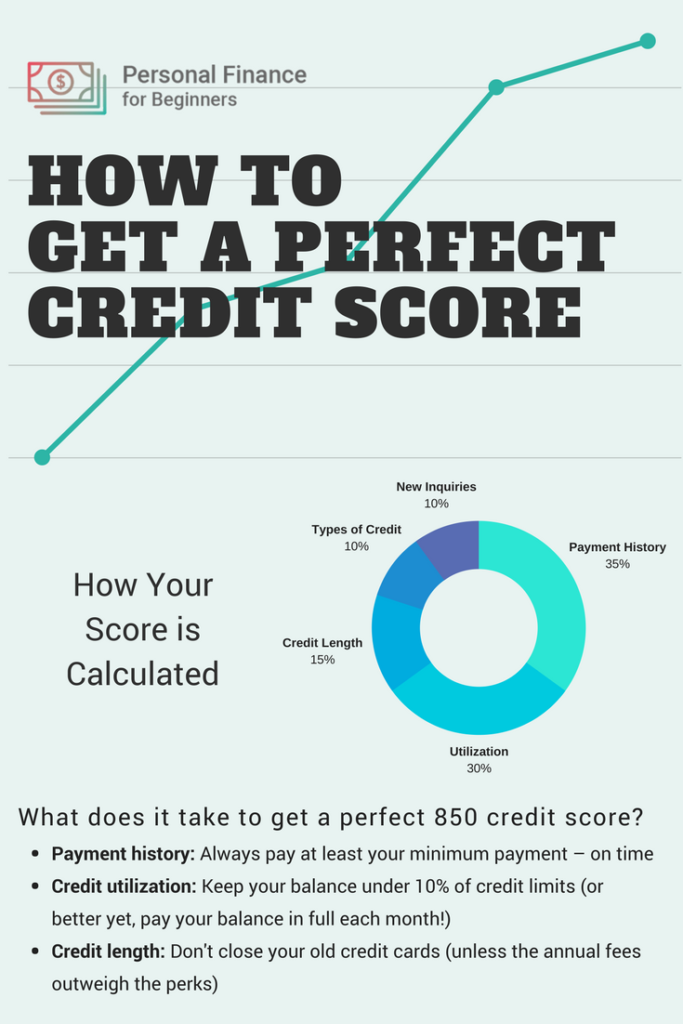 Conclusion
Conclusion
Chasing a perfect score isn’t right for everyone.
It’s more of a “quest” for personal finance enthusiasts to focus on after getting the rest of their finances in order.
For personal finance beginners, there are two main benefits to pursuing the highest credit score possible: qualifying for better interest rates and developing good financial habits.
If your credit situation needs to be improved, focus on the basics: reviewing your credit report for errors, making all of your payments on time, and paying down your balances as far as possible.
Why do you want to improve your credit score? Do you want to reach a perfect score – why or why not?

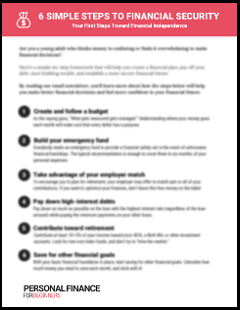
I’m not too worried about how “perfect” my credit score is – I’m more concerned with it’s change over time. Not too long ago I had a score somewhere in the 500’s, now it’s closer to 750. Basically, everything you hit on in this article about how to get the highest credit score is exactly what I’ve done to improve my credit. That, and a large helping of patience.
Hey Joe, that kind of improvement takes a lot of work and sure doesn’t happen overnight. Nice job! That jump from the 500’s up to 750 definitely benefits you more than a perfect 850 ever could.